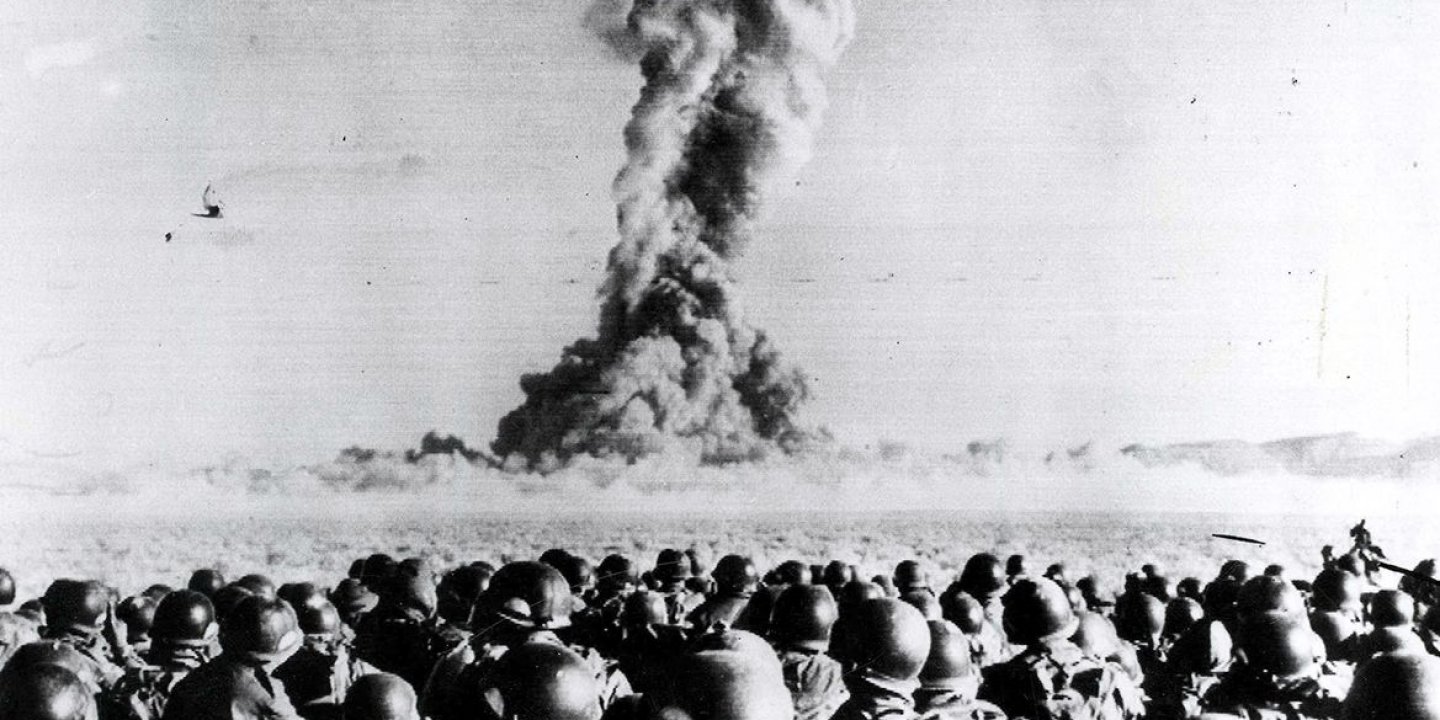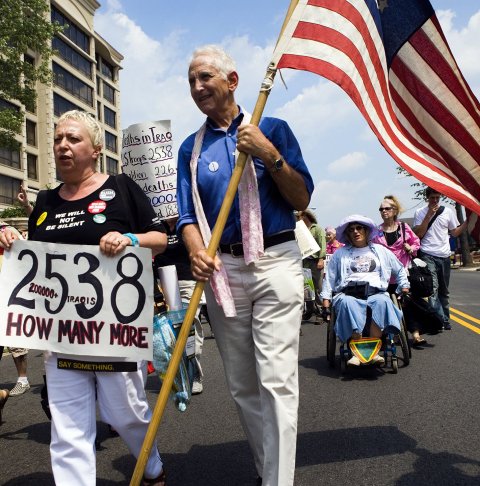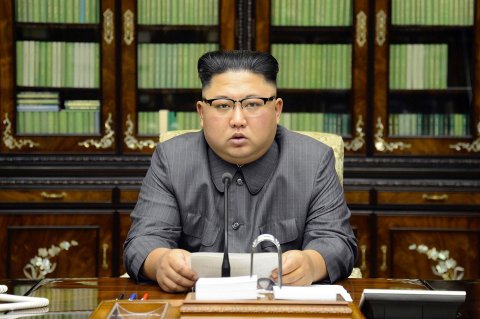Daniel Ellsberg Warns of 'No Survivors' if U.S. Goes
to War With 'Criminally Insane' Nuclear Weapons
BY NINA BURLEIGH ON
05/03/18 AT 7:00 AM EDT

An
atomic bomb was detonated at a Nevada test site 75 miles northwest of Las Vegas
in 1951. It was understood that about 1,500 soldiers were on the ground at a
safe distance from the blast.POPPERFOTO/GETTY
Daniel Ellsberg is best known as the defense analyst
who leaked the Pentagon Papers and exposed Defense Department lies about
American involvement in the Vietnam War. But in 1971, when he took those top
secret documents out of his office safe at the Rand Corp., he also took a cache
of materials related to his job as one architect of America's mutually assured
destruction nuclear strategy, or MAD.
He hid the top-secret nuclear papers in plastic bags
on his brother's farm in upstate New York, intending to reveal them after the
furor over the Pentagon Papers died down. But Tropical Storm Doria in 1971
eroded the hiding place, and he never saw his papers again.
Now a hale and vigorous 87, he is stumping the country
giving talks about his latest book, The Doomsday Machine: Confessions
of a Nuclear War Planner. It recounts his participation in what he calls
America's "criminally insane" nuclear program. Newsweek caught
up with him in Washington, D.C., where he was addressing a gathering of
progressive lobbyists on the day President Donald Trump decided to bomb Syria,
a country where five nuclear-armed nations have been involved during its civil
war. Ellsberg, who wants the United States to abandon its willingness to use
nuclear weapons offensively (the so-called first-use policy), said the weapons
system he and his compatriots invented in the Dr. Strangelove years remains as
hair-trigger as ever, and that a mere technical glitch or political clash with
Russia could end with major American cities reduced to smoking ash with just 30
minutes' notice.
This topic is terrifying and your book is so
depressing. Why should people read it when, obviously, everyone would prefer to
be in the dark?
When people say they enjoy my talk, I have to look askance of them, like, Are
you some kind of weirdo? But as in Vietnam, if they know the obstacles and the
challenges, it gives them a chance to make change—low as that chance may be.
Without the information, you have no sense of the inertia of the system or what
the obstacles are. The information gives you an understanding of why it has
changed so little over the last half-century and where possibly the points of
leverage might be.
Ellsberg,
who released the Pentagon Papers in 1971, rallies with anti-war activists
during a march to the White House in 2006 in Washington, D.C.BRENDAN
SMIALOWSKI/GETTY
If, as you say, the nuclear weapons system is
"criminally insane," how did you, as one of the original planners,
morally justify it then and are people still thinking the way you did?
Clearly they are. I'm not pointing fingers and saying you must be some sort of
monster to have been participating in this. What I have learned is that very
ordinary people are capable of participating in and promoting monstrous actions
all the time. It doesn't take unusually evil people to do terrible things. In
the case of building up a doomsday machine, the purpose was to deter an enemy
that was supposedly far ahead of us. We were told to see the USSR as Hitler
with nuclear weapons.
You talk about what happens to people who enter the
system on one side and come out on the other. Late in his second term,
President Obama—who received a Nobel Prize for his anti-nuclear position and
who spoke at Hiroshima, calling for the abolition of nuclear weapons—agreed to
spend more than a trillion dollars to upgrade them. How much of that
transformational process has to do with supporting the industry that developed
around nukes?
I now see that this system was a massive subsidy to the aerospace industry, to
prop it up. It was not that [aerospace companies] were doing what the Pentagon
needed; it was that the Pentagon was rationalizing what Boeing and Raytheon and
Lockheed needed in the way of sales to the government. That has warped
everything. The profits and the jobs and the votes have evolved. [Members of
Congress acted] in favor of what their constituents and the corporations
needed, [as well as] what their careers needed. And they didn't see a conflict
of interest there because they could not imagine a conflict of interest between
the U.S. and Lockheed. That's blatantly true now.
You describe the predicted effects of nuclear war to
be the extinction of all species and almost all humanity. If that is the
outcome, what is the definition of winning a nuclear war?
Remember, we won a nuclear war. But it was one-sided. No war has been fought
between two nuclear states. Right now, they are thinking of winning a nuclear
war with North Korea. I am sure [national security adviser John] Bolton is
thinking that. Well, we would win. We'd still be here. But Korea—North and
South—would be gone. [We may lose] San Francisco. Or Los Angeles. You could say
one side would come out surviving. But for the U.S. and Russia, that would not
be the case. There would be no survivors. With India and Pakistan, also, no
survivors.

North
Korean leader Kim Jong-Un delivers a statement in Pyongyang concerning a speech
U.S. President Donald Trump made at the U.N. General Assembly, saying Trump is
"mentally deranged" and that he will "pay dearly" for his
threat to destroy North Korea.STR/AFP/KCNA/KNS/GETTY
Who are the five people in the world you would most
want to read this book?
The first name that comes to mind is [German Chancellor] Angela Merkel. I think she's in a position to realize that she could exercise world leadership on this issue with great effect. We instituted first-use threats for Germany, and she could renounce that and say we do not want to be under anybody's nuclear umbrella.
The first name that comes to mind is [German Chancellor] Angela Merkel. I think she's in a position to realize that she could exercise world leadership on this issue with great effect. We instituted first-use threats for Germany, and she could renounce that and say we do not want to be under anybody's nuclear umbrella.
The next person, maybe even No. 1, is Xi [Jinping] in
China. I would like to see China's world leadership on this issue. Xi does eat
chocolate cake with Trump. And they have had a relatively sane policy since
1964. They have had no pretense to be able to disarm another superpower or to
attack first. The world would be enormously safer if all the superpowers did
that.
After that, [British Labour Party leader] Jeremy
Corbyn. He wants to denuclearize Britain. Corbyn would be reassured that he is
right, and realize 'these weapons are as insane as I've been saying.'
No comments:
Post a Comment
Note: Only a member of this blog may post a comment.